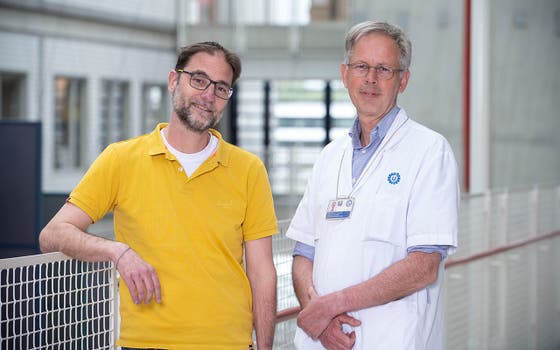UMC Utrecht coordinates European study on the use of artificial intelligence in the management of rheumatoid arthritis

UMC Utrecht has received a large European grant to coordinate an international study that will investigate the use of computational models as a decision aid in the management of difficult-to-treat rheumatoid arthritis. For this 6-year study, an amount of € 2 million has been allocated to UMC Utrecht, out of a total budget of € 6.1 million.
Difficult-to-treat rheumatoid arthritis (D2T RA) is an area of high unmet medical need with major socio-economic consequences for patients and society. Contributing factors that have been identified include co-morbidities as well as drug-related, biological and behavioral factors. However, properly identifying such patients with specific underlying and overlapping problems, or patients at high risk, is a major challenge in routine clinical practice. Currently, treatment decisions are often random and are neither sufficiently patient tailored nor data-driven. To achieve better treatment choices for these patients in the future, doctors expect a lot from artificial intelligence (AI).
Computational models
The STRATA-FIT (Stratification of Rheumatoid Arthritis: CompuTational models to personalise mAnagement strategies for difFIcult-to-Treat disease) consortium sets out to use AI to develop and validate computational models that are able to identify D2T RA patients and classify them into clinically relevant phenotypes using large amounts of real world clinical data. In addition, the investigators will measure biomarkers of inflammation to further characterize these phenotypes. Subsequently, they will execute a pilot study with a clinical decision aid that is based on their models to assess the effectiveness of personalized treatment strategies. In parallel, they will develop a computational model to identify recently diagnosed RA patients at risk of developing D2T RA. By doing so they cannot only provide better treatment for patients with D2T RA, but also work towards its prevention in early RA patients. STRATA-FIT will establish a unique European Learning Healthcare System, using a privacy-proof, state-of-the-art federated learning infrastructure in which patients with, or at high risk of D2T RA, are identified, stratified and treated in a personalized manner.
Kick-off
The principal investigator of STRATA-FIT is rheumatologist prof. Jaap van Laar MD PhD and the study coordinator is methodologist Paco Welsing PhD (both UMC Utrecht). Jaap van Laar says: “May 30th marked the start of the STRATA-FIT Consortium. The kick-off meeting took place in Milan in conjunction with the Annual European Congress of Rheumatology. Representatives from all research partner institutes , Medical Data Works and patient representatives from EULAR joined this hybrid meeting. During the meeting, the plans for the first project year were discussed in detail. Several key firsts steps and important cross-links between the various tasks were identified and discussed. Also the practical steps for setting up the local and central learning infrastructure were discussed, including a demonstration of how this could look like. At the end of the meeting, all participants were on the same page with respect to the planning and execution of this exciting project led by UMC Utrecht.“
Difficult-to-treat disease
In recent years, the management of RA has improved considerably. Unfortunately, a substantial proportion of patients continue to have symptoms despite being treated with various newer disease-modifying antirheumatic drugs according to the current management recommendations of the European Alliance of Associations for Rheumatology (EULAR). These patients are referred to as having D2T RA. This is a heterogeneous and multifactorial disease state, and the major problems are uncontrolled disease activity and decreased quality of life, as well as a major economic burden due to frequent healthcare utilization and multiple admissions. A recent study estimates that 5-20 percent of all patients with RA suffer from D2T RA.
About STRATA-FIT
The STRATA-FIT consortium builds on previous work by consortium partners, who initiated and led the European Task Force on developing points to consider for managing D2T RA. STRATA-FIT brings together clinical experts, patient research partners and clinical-, biological-, data- and computer-scientists to tackle this major clinical challenge. When successful, STRATA-FIT will lead to more (cost-) effective D2T RA care and will greatly improve the quality of life of D2T RA patients while lowering the burden of D2T RA on Europe’s health care systems and society. The consortium is financed by a grant of € 6.1 million from the European Union. Consortium partners are UMC Utrecht (Utrecht, the Netherlands), Instituto de Medicina Molecular Joao Lobo Antunes (Lisbon, Portugal), Karolinska Institutet (Stockholm, Sweden), Medizinische Universität Wien (Vienna, Austria), Ludwig-Maximilians-Universität München (Munich, Germany), Klinikum Der Universität München (Munich, Germany), Region Stockholm (Stockholm, Sweden), Medical Data Works (Maastricht, the Netherlands) and the European Alliance of Associations for Rheumatology (Kilchberg, Switzerland).
Can I participate in this study?
In the STRATA-FIT study, routine clinical data (such as demographics and lab results) will be used that have already been obtained from patients that are under treatment at one of the clinical consortium partners. As a consequence, no further patients are needed and patients can therefore not apply to participate in this study.
